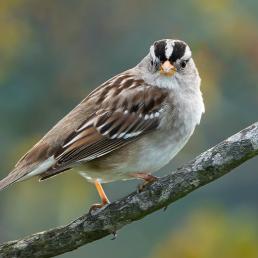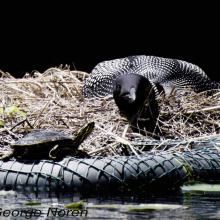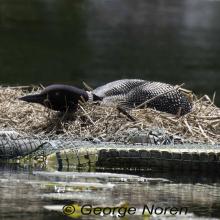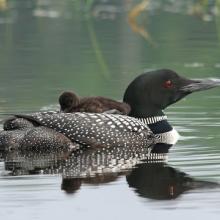

Join BirdNote tomorrow, November 30th!
Illustrator David Sibley and actor H. Jon Benjamin will face off in the bird illustration battle of the century during BirdNote's Year-end Celebration and Auction!
To hear a Common Loon in the wild during summer, you’ll need to find a northern, freshwater lake where a pair is nesting. But to find that same Common Loon in winter, you’ll likely need to look on a saltwater bay. This shift from fresh to salt water would kill most animals. But loons — along with many ducks and other water birds — have evolved to make that move. It’s possible that breeding adults nest on fresh water in order to save their energy for raising chicks.
BirdNote®
Loons, Salt Water, and the Seasons
Birds Make the Move from Fresh to Salt Water
Written by Bob Sundstrom
This is BirdNote.
[Common Loon call, http://macaulaylibrary.org/audio/107964, 0.07-.09, repeat]
To hear a Common Loon in the wild during the summer, you’ll need to find a northern, freshwater lake where a pair is nesting. But to find that same Common Loon in winter, you’ll likely need to look on a saltwater bay.
[Common Loon call, http://macaulaylibrary.org/audio/197039, 0.14-.19]
This shift from fresh to salt water would kill most animals. But loons — along with many ducks and other water birds — have evolved to be able to make that move.
When a loon starts ingesting prey and water that’s high in salt, that salt gets into its bloodstream. This sets off a complex physiological process that reaches its end point in a pair of glands above the eyes.
These glands, also activated by the higher salt levels in the body, excrete the excess salt through a duct that leads to the bird’s nostrils. From there, the salty solution runs down the beak and back into the environment.
When switched on, the salt glands burn up a lot of calories. So it’s possible that breeding adults nest on fresh water to save that energy for raising chicks. But most of these areas start to freeze over come late fall. And then it’s time to seek a watery place that won’t freeze.
A salty one, like the Gulf of Mexico or Puget Sound.
For BirdNote, I’m Michael Stein.
[Common Loon call, http://macaulaylibrary.org/audio/197039, 0.14-.19]
###
Bird sounds provided by The Macaulay Library of Natural Sounds at the Cornell Lab of Ornithology, Ithaca, New York. Common Loon call [107964] recorded by Steve R Pantle; [107964] recorded by Bob McGuire.
BirdNote's theme music was composed and played by Nancy Rumbel and John Kessler.
Producer: John Kessler
Executive Producer: Dominic Black
© 2016 Tune In to Nature.org June 2018/2019 / March 2023
Narrator: Michael Stein
ID#: saltgland-01-2016-06-20 saltgland-01








